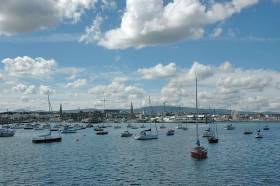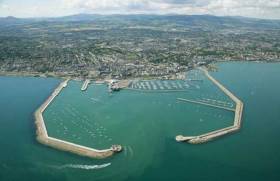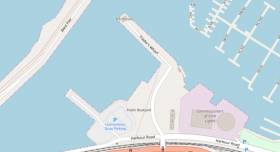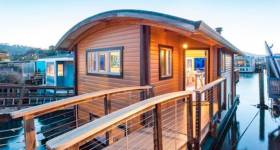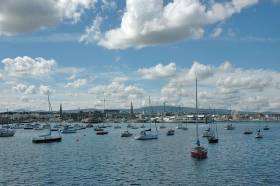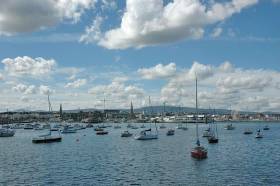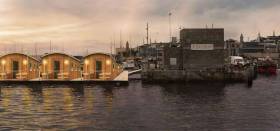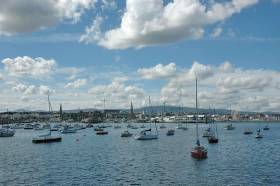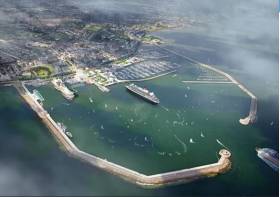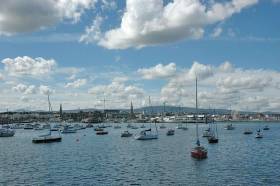Displaying items by tag: Dun Laoghaire Harbour Company
DLRCoCo To Recommend Dissolution Of Dun Laoghaire Harbour Company For Council Control
#DLHarbour - Dun Laoghaire-Rathdown County Council will recommend the dissolution of Dun Laoghaire Harbour Company and the transfer of its assets to the local authority at a meeting next week, The Irish Times reports.
Following months of slow progress, DLRCoCo chief executive Philomela Poole will tell councillors on Tuesday 6 March that the second of two options as outlined in the Harbours Act 2015 is best to help secure Dun Laoghaire’s future — a move that is being hailed by local campaigners Save Our Seafront.
In an information pack distributed to DLRCoCo members in advance of next week’s meeting, as seen by Afloat.ie, Poole states: “It has become increasingly clear over the past decade that the long-term future of Dun Laoghaire Harbour Company will be in terms of marine leisure, maritime tourism, cultural amenity and urban redevelopment … Therefore it is appropriate that the plans be developed under the aegis of and in co-operation with Dún Laoghaire-Rathdown County Council.”
Under the Harbours Act 2015, the Minister for Transport may choose between two options for the future governance of Dun Laoghaire Harbour: the transfer of shareholding of the harbour company to DLRCoCo, or the dissolution of the company and transfers of its assets, liabilities and staff to the local authority.
A risk assessment undertaken by consultants The Finance Expert concluded that the financial risks to the council “would be common to both options” but of the two, the second gives “a lower operational risk and more direct control of the harbour’s activities.”
The risk assessment, based on accounts ending 31 December 2016, projects the net financial risk for the period 2018-2022 as €33.5 million — the bulk of this to bring the harbour up to ‘taking-in-charge’ standard.
However, Afloat.ie understands that a figure in excess of €150 million over 10 years for harbour infrastructure alone has been mooted — while another source estimates conservation and repair at some €250,000 per annum.
In addition, the risk assessment did not examine or evaluate “potential legal costs associated with resolving the ownership of the foreshore at St Michael’s Pier.”
The Irish Times has more on the story HERE.
See also: David O’Brien on Dun Laoghaire’s need for a ‘harbour czar’ to steer it on the right course.
Dun Laoghaire Harbour Company 'Risk' Report to be Presented to DLRCoCo Next Month (UPDATED).
Minister Transport Minister for Transport, Tourism and Sport, Shane Ross TD expects the final report of the risk assessor on the hand over of Dun Laoghaire Harbour Company to the local County Council will be presented to the council at a meeting scheduled to take place on 26 February but now changed to Tuesday, March 6th.
UPDATE: A DLRCoCo spokesperson advises meeting will now be held on March 6th at 6.30pm and will be webcast.
Minister Ross says that after that he 'expects matters to then progress towards the agreement of a model and a transfer date'.
The information was given to Senator Victor Boyhan who called on the Minister to 'indicate his intentions to authorise the transfer of Dún Laoghaire Harbour Company from the State to Dún Laoghaire-Rathdown County Council', as provided for under the Harbours Act 2015.
In a detailed reply to the Senator, Ross also told the Seanad, 'there are two court cases which constrains me enormously in terms of what I can say about some of the issues raised'.
'They are very delicate issues and I do not want to say anything which would prejudice the case', he added.
Read the details from the Seanad Éireann debate Tuesday, 6 Feb 2018 here.
Boyhan previously raised the matter of the transfer of the Harbour to the County Council in December, as Afloat.ie reported here
‘National Watersport Centre’ For Dun Laoghaire Back On Agenda With Launch Of Market Consultation
#Watersport - Proposals for a national watersport centre in Dun Laoghaire Harbour have been revived with the launch of a preliminary market consultation.
Afloat.ie previously reported on plans in 2015 for a ‘National Watersports Academy’ on the site of the former Stena HSS terminal.
With that facility at St Michael’s Pier set to reopen later this year as the Harbour Innovation Campus, Dun Laoghaire Harbour Company has scaled back its plans and selected a new location at Traders Wharf further to the west, close to the existing home of the Irish National Sailing & Powerboat School.
Per the consultation document, the harbour company “envisions a multi-discipline centre” encompassing sailing, powerboating and related training; diving; kayaking and SUP; rowing and dragon boating; windsurfing, wakeboarding and waterskiing.
“This is an exciting initiative, which could provide a high calibre water sports centre in a truly unique marine environment,” the harbour company adds.
Expressions of interest are being sought from “parties with the relevant expertise, experience and resources” by 5pm on Tuesday 13 March to Gerry Dunne at [email protected].
‘Floating Homes’ Plan For Dun Laoghaire Harbour Moves Forward
#Property - Plans to develop “floating homes” in Dun Laoghaire Harbour — and refocus the area on accommodation as well as leisure — have moved a step forward as a formal procurement process is set to begin.
Last September, the Dun Laoghaire Harbour Company sought expressions of interest for plans comprising “a cluster of floating affordable homes” moored in the harbour.
“About two years ago we looked at the notion of a floating hotel,” Dun Laoghaire Harbour Company chief Gerry Dunne told the Sunday Independent. “This concept is the same — to utilise the water space for residential purposes, rather than just leaving it for leisure pursuits.”
The precise specification of the final homes has get to be determined, though a retail price of up to €350,000 is to be expected.
Dunne also expects that if the procurement process is completed in the first quarter of this year, “we could have the floating homes project up and running in 2019.”
The Sunday Independent has more on the story HERE.
#DLHarbour - Dun Laoghaire Harbour Company has issued its first notices to mariners for 2018, superseding all previous marine notices.
Regarding fairway priorities, the harbour fairways and approaches are generally to be kept clear and free. It is prohibited to anchor or lay moorings in these areas as marked on navigational publications and charts.
No race marks, buoys, floats, etc are to be laid in the fairways or the near approaches to Dun Laoghaire Harbour – and no racing shall take place other than by specific written permission from the Harbour Master.
Any lobster/crab pots that are laid shall remain clear of all harbour navigational waters, and slipways.
Large power-driven vessels (cruise liners, ferries, lighthouse and Naval Service vessels) and smaller power-driven vessels with restricted manoeuvrability (such as cruise ship tenders and small passenger ferries) have priority over all other craft, including the area of the harbour limits that extend 600 metres seaward of the harbour mouth.
Large power-driven vessels are to sound a prolonged blast when approaching the harbour mouth from either direction, or the appropriate signal when manoeuvring off, departing or preparing to depart from their berths.
A vessel may also sound a preliminary, prolonged blast, just prior to departure, so as to alert other harbour users of its imminent departure.
Irrespective as to whether or not any such signal is sounded, the obligation remains for small craft togive priority to the large power-driven vessels.
Regarding VHF reporting, all vessels, excluding pleasure craft, are required to call ‘Harbour Office Dun Laoghaire’ on VHF Channel 14 as follows:
- ETA at harbour entrance at least two hours in advance, and for any scheduled ferries call at least half an hour in advance.
- ETD at least one hour in advance, followed by confirmation five minutes prior to departure.
Unscheduled arrivals should call ‘Harbour Office Dun Laoghaire’ on mobile +353 83 144 3412 (24hr) at least two hours before arrival.
DL Harbour Company Seeks New Foreshore Licence For Existing Moorings
#DunLaoghaire - Dun Laoghaire Harbour Company has applied for a foreshore licence for the continued provision and maintenance of the existing moorings within the harbour.
The 10-year licence is intended to renew the previous decade-long foreshore lease, which has since expired.
No new works are proposed for the existing moorings, which are let to various marine organisations, private individuals and the harbour’s yacht clubs.
Full details of the application are available on the Department of Housing, Planning and Local Government website.
The application is separate from the expressions of interest the harbour company is seeking for “a cluster of floating homes”, as previously reported on Afloat.ie.
Dun Laoghaire Seeks Interest For ‘Floating Homes’ Proposal
#Property - Plans for “a cluster of floating affordable homes” in Dun Laoghaire could soon transform the look of the South Dublin port’s waterfront.
The Dun Laoghaire Harbour Company is seeking expressions of interest via the State’s eTenders website for the development of as many as 50 single-storey homes, which would float on a pontoon on the western side of the Coal Harbour Dock.
According to The Irish Times, harbour company CEO Gerry Dunne says the floating homes — around the size of the average two-bed apartment — would have a capital cost of between €250,000 and €300,000 and would be geared towards those looking for a “starter or retirement” home.
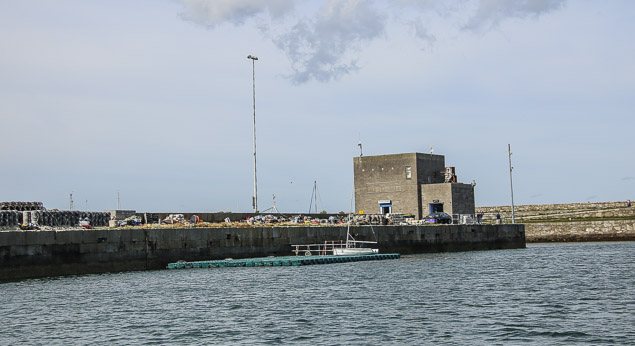 The site identified for the new floating homes in Dun Laoghaire Harbour known locally as the 'ice house' at the Coal Quays Photo: Afloat.ie
The site identified for the new floating homes in Dun Laoghaire Harbour known locally as the 'ice house' at the Coal Quays Photo: Afloat.ie
Floating accomodation is already in use by businesses in the capital, such as at Grand Canal Dock, but this is the first proposal for such a residential development in Ireland.
The Irish Times as more on the story HERE.
DL Harbour CEO To Seek More Than €350k In Unpaid Bonuses
#DLHarbour - Dun Laoghaire Harbour Company’s chief executive is seeking over €350,000 in backdated bonuses from the company, as Jack Horgan-Jones writes in yesterday’s Sunday Business Post.
Gerry Dunne lodged High Court proceedings against his employer in September last year, as previously reported on Afloat.ie.
But it has only emerged now that Dunne, who took over as CEO of the beleaguered port company in 2009, will argue for the payment of bonuses stipulated by his contract.
Such payments have been withheld under current Government policy not to pay performance-related top-ups to the executives of State or semi-State companies.
Dunne spearheaded the ‘masterplan’ for the regeneration of Dun Laoghaire Harbour in 2011. However, the South Dublin port subsequently lost its anchor ferry link to Holyhead.
Few of the masterplan’s proposals have come to fruition in the six years since its launch, though plans to accommodate large scale cruise liners, previously subject to restrictions and much controversy, are now back on the agenda.
Dún Laoghaire Harbour Company Say 'Cruise Berth Facility On Track', An Bord Pleanála Seek Further Information
Dún Laoghaire Harbour Company (DLHC) has issued a statement on its cruise berth facility following yesterday's court case decision in which environmental lobby group Save our Seafront, chaired by local TD Richard Boyd Barret, 'won its legal action against the decision to grant planning permission for the Dún Laoghaire Cruise Terminal'.
The Harbour Company maintain its 'Cruise berth facility is on track' as An Board Pleanála seek further information the state company.
The full ramification of this decision are still being fully analysed but the DLHC statement in full is below:
'Dún Laoghaire Harbour Company (DLHC) has been informed that An Bord Pleanála will not be defending a Judicial Review of the decision of the Bord to grant planning permission to DLHC for the development of a cruise berth facility in the harbour. The Judicial Review had been taken on behalf of Save our Seafront, who had opposed the development. An Bord Pleanála has now determined that certain technical requirements of the Habitats Directive necessitate additional information to be supplied by DLHC. It is recommending that the planning application is sent back to the Bord for this additional information to be assessed. DLHC will co-operate fully with such a request by An Bord Pleanála.
Commenting, DLHC CEO Gerry Dunne pointed out that while the nature of the issues have yet to be outlined in detail they are believed to be “technical and not substantive”. Mr Dunne added that protecting the sensitive environmental and historical significance of the harbour and its environs remain a priority for DLHC.
The proposed 250 metre berth will, it is anticipated, attract c. 50 cruise calls a year (from May to September), an average of 2 a week. The money generated from these visitors will amount to €10m to the local economy annually'.
A statement from Save our Seafront, on yesterday's court case is here.
#DunLaoghaire - Close to 100 people attended a meeting last night (Thursday 27 October) in the Royal Marine Hotel organised by the Save Our Seafront (SOS) community group, writes our special correspondent.
SOS campaigns for the public interest in the foreshore of Dun Laoghaire and against what they believe to be the inappropriate developments proposed by the authorities with responsibility for the coastal aspects of the harbour and the borough.
An imminent decision by An Bord Pleanala on the Dun Laoghaire Harbour Company’s (DLHC) application to develop a major cruise liner terminal in the harbour was a significant factor in the discussion.
But the general sentiment was that no matter what the outcome, DLHC’s finances are widely believed to be in such a position that development would not be possible.
The alleged lack of fiscal responsibility by the DHLC was referred to repeatedly by the top table and from the floor.
Dun Laoghaire-Rathdown councillors were not spared criticism, either, as several participants noted Cllr Melisa Halpin was the only one of the 40 elected representatives in attendance.
The recent pronouncement in the Senate by Transport Minister Shane Ross that a transfer of the responsibilities of DLHC was imminent was linked by Richard Boyd Barrett TD to the delay in the planning decision, when he said: “After five years in the Dáil, I don't believe in coincidences anymore.”
The meeting encouraged participants to lobby their councillors to vote for a complete takeover of the DLHC by the council, rather than the ‘quango’ option whereby the DLHC would remain as an entity within the council structure.
All types of harbour users were present at the meeting, many of whom were sailors.
Speakers concurred that the future of the harbour lay in water sports and in the wider maritime heritage sector, partially supported by smaller commercial activity than that envisaged by the DLHC.



























